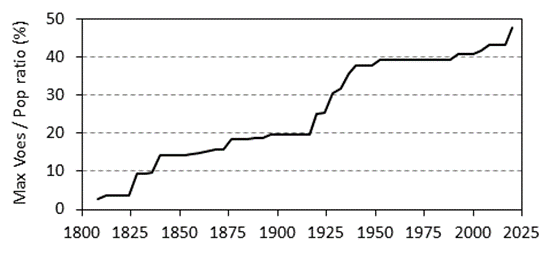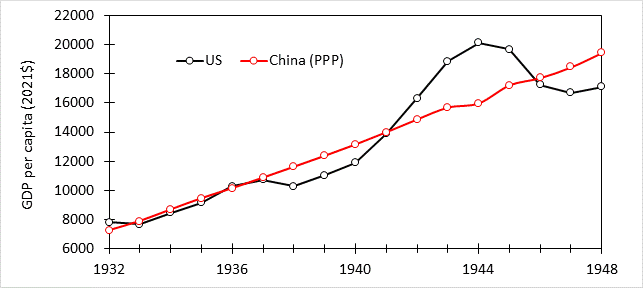Some thoughts on Neoreaction
Curtis Yarvin is one of the architects of the philosophy called Neoreaction, which I previously wrote about. He has been described as one who uses ten thousand words where a hundred would serve. Marx is similarly wordy, but he once wrote a manifesto that described his views in a reasonably compact form, which I read many years ago for a class. It just found out that Yarvin wrote one as well, which I read. He calls his philosophy Formalism rather than Neoreaction, but it seems to represent a starting point for his ideas. In this post I do two things. First I quote some of the manifesto in bolded italics and give my response to it. Secondly I give a short critique of his basic argument as I understood it from his manifesto.
I. Response to selected quotes
it is hard to avoid noticing two basic facts about the universe. One is that libertarianism is an extremely obvious idea. The other is that it has never been successfully implemented…This does not prove anything.
Yes, it does. It means there is something wrong with libertarianism as a system for organizing human affairs.
Violence of any size makes no sense without uncertainty. Consider a war. If one army knows it will lose the war, perhaps on the advice of some infallible oracle, it has no reason to fight. Why not surrender and get it over with?
Sometimes people won’t do this. They believe there are things worse than death and will fight to avoid experiencing these things until death ends their experience of anything.
The basic idea of formalism is just that the main problem in human affairs is violence. The goal is to design a way for humans to interact, on a planet of remarkably limited size, without violence, especially organized violence.
As a reader of libertarian literature, Yarvin starts out with a classical liberal paradigm. Humans are obviously animals, but we are different from other animals who lack language, art, or philosophy. Enlightenment philosophers argued that it was the human propensity for rational thought (made possible by their large brains) that was the difference. They then built a theory for the existence of things like states as the product of rational “social contracts” between people. This rationalist belief system implies by arranging things in a way we all agree is logical we could get rid of violence, eliminating the need for the state. That is, through some form of philosophical hocus pocus humans would cease being primates and become herd animals. Needless to say, it doesn’t work that way.
This problem has been partially solved at the interpersonal level. Our closest relatives, chimps, are far more interpersonally violent than humans. Over millennia, humans have selectively eliminated obnoxious, violent males from the gene pool, selecting for less-violent human lineages in a process of self-domestication, giving rise to prestige-based hierachies as an alternative to dominance-based hierachies found among primates. Another factor reducing violence and enabling cooperation among large numbers of humans are cultural constructs such as moralistic, or “Big God” religions and systems of ethics. Like chimps, humans still possess a propensity for group violence (e.g. wars). Through cultural evolution, humans have developed the ability to form stable societies of ever-increasing size. Though violence between these groups continues, the growth in societal size has led to falling levels of per-capita lethality from inter-group violence. Growth in group size is achieved through the evolution of social scale-up technologies or institutions that enable cooperation at larger scales. The state is one of these.
The key is to look at this not as a moral problem, but as an engineering problem.
Here is a core problem with Yarvin’s work. Engineers who work with natural systems require an understanding of the natural science theories that describe how the system operates. Yarvin is a software engineer who works with computer systems created by humans. The rules governing the operation of these systems are known with such precision and accuracy that complex programs that produce predictable and useful outputs are routinely created. Similar results can be achieved in some natural systems, such those described by well-developed physical theories. Other natural systems like biological or ecological ones are less well described theoretically. Efforts to design equally complex structures in these systems would collapse into chaos, producing no useful output. But Yarvin is talking about engineering social systems, for which there is no theory which even remotely matches the power and specificity of physical theories or the computer systems with which he is familiar. His project is doomed to failure at the outset.
I have no idea what the purpose of the US is.
The Constitution proclaims that the American state exists “to establish justice, ensure domestic tranquility, provide for the common defense, promote the general welfare, and secure the blessings of liberty” to the people of the United States and their posterity. The first three functions are pretty standard. From their beginnings in the 12th century, functional Western states have administered justice, maintained order, and defended their territory. The Constitution adds two additional functions: secure liberty and promote general welfare, which reflect the call in the Declaration of Independence for liberty and pursuit of happiness. The addition of the Bill of Rights to the Constitution was an effort to achieve the first of these and many of departments added to the government since 1789 were efforts to serve the welfare objective.
A Formalist is only happy when ownership and control [of the state] are one and the same.
The Formalist will then be unhappy because the state does not necessarily belong to the people who embody it even though they control its actions. Even corporations do not have a unity of ownership and control. Corporations may be owned by shareholders, but they are created by the state who retains some controlling interest by insisting the corporation follow its laws. Not only that, but like James I did with the Virginia company, the US reserves a right to a share of the profits through the corporate tax.
The US...is just a big old company that holds a huge pile of assets [and] has no clear idea of what it’s trying to do with them…To a formalist, the way to fix the US is to figure out who owns this monstrosity, and let them decide what in the heck they are going to do with it.
The US is a state, not a corporation. A corporation is created by a higher authority—the state is not, as there is no higher authority. The state holds a monopoly on the legitimate use of violence. The ability of the state to wield violence (and prohibit others from doing the same in its territory) is called sovereignty and is a key feature that defines a state. As mentioned earlier, the state is a cultural institution that performs a function enabling cooperation among large numbers of humans. One of the cooperative behaviors enabled by the state is war. The ability of states to bring more numbers, or power, to the battlefield helps it prevail in conflicts with smaller or less powerful groups and to deter attacks from peers. In an anarchic world of competing tribes, clans and states, large states had an advantage, generating a selective pressure for cultural elements supporting the maintenance of states and empires of ever-increasing size.
II. Discussion of Yarvin’s ideas
Yarvin starts with a libertarian worldview based on reading books libertarians tend to read, but he realizes that libertarianism is unrealistic. He notes that a good Formalist will acknowledge that the US government has the right to make policy over its territory because it owns that territory. He argues “we need to figure out who has actual power in the US, and assign shares in such a way as to reproduce this distribution as closely as possible.” That is, the US should be ruled by a dictator (CEO) representing oligarchs (as shareholders). Those ill-served by the state would have no recourse other than emigration (assuming there is another polity who will accept them).
A Formalist recognizes that the pacification of our primate nature achieved through genetic and cultural evolution is incomplete, we still need order and the rule of law to back cultural norms. There is still a need for sovereignty, that is, the state. But the rest of his thinking is still based on libertarian ideas. A central flaw in libertarianism (and why is had not been enacted) is its parasitic nature. Because of its erroneous beliefs in human rationality, they do not acknowledge the major role cultural norms and institutions play in ensuring the large-scale cooperation needed to sustain things like a market economy, the rule of law, and property rights that libertarians take for granted. Their CEO state would sit on top of these, doing nothing to sustain them, assuming they will just continue producing their desirable products for free. Today, after decades of a shareholder primacy culture that puts the interests of owners (those Yarvin wants to put in charge of the state) above all others, America is widely seen as a nation in decline. No effort has been expended on maintaining the cultural fabric that sustains our civilization, and Yarvin apparently sees no need for this.
It is understandable why he believes his extractive system can work. For much of history, most people lived in just this sort of system. The earliest states employed despotism, featuring extreme differences between the status of those at the top and bottom of the hierarchy. Classes ranged from the despot at the top, who was frequently considered a god, to those at the bottom, used as slaves or for human sacrifice. Such polities experienced significant instability. Sometmes such a state rose and fell with the personal reign of an individual ruler. In other cases they could last longer but generally not beyond a single secular cycle.
The development of moralistic religions and philosophies led to restrictions on monarch behavior that produced traditional monarchy. Adherence to these restrictions lent legitimacy to the monarch. Legitimacy is cultural construct (e.g. the Mandate of Heaven) that reduces the likelihood of subordinate challenges to the monarch, which promotes stability, making it better able to compete against rivals. It also enabled a civilization to survive for multiple secular cycles (America in Crisis, p 11).
Traditional monarchy worked fairly well until the rise of capitalism increased economic complexity, greatly increasing the number of elite subordinates to the ruler needed to keep the state operating. With more ambitious subordinates, legitimacy had to be strengthened. Concurrent with the development of capitalism came the Enlightenment which created notions like the social contract, which were used to develop more restrictions (such as constitutions and elections) on the state’s power which served to boost legitimacy. These restrictions gave rise to increasingly democratic governments as measured by rising trend in voting rates over time (see Figure 1). Enlightenment concepts like the social contract play a major role in libertarian thinking about politics. Yarvin’s libertarian philosophers were on the right track, they simply did not like democracy and wanted to get rid of it, perhaps because it was well suited to serve leftwing politics. But Yarvin provides no alternate mechanism for legitimacy generation other than the raw force or cult of pesonality used in despotism. I note that recent examples of such systems were the Soviet Union which lasted one secular cycle and Facist Italy, Nazi Germany and Falangist Spain that lasted for only the lifetime of its leader, in contrast with the US, which is on its third secular cycle.
Figure 1. Rising voting rates in US presidential elections 1808-2020.
The operation of a complex modern state required the development of a large bureaucracy, both public and private, that Yavin later called the Cathedral. Yarvin observes that “the postwar Western system has assigned almost all actual decision-making power to its civil servants and judges,” (i.e. this Cathedral) and observes that it “appears to work because it is…a mediocre implementation of formalism.” Since we already have formalism, what is Yarvin’s beef?
Yarvin’s problem with the current system seems to be aesthetic. He shares the right-libertarian aversion to democracy and preference for hierarchy and dislikes the current version of formalism. He suggests authoritarian rule in city-states such as Singapore, Hong Kong and Dubai as possible models of a better implementation of formalism. If you look at any of these polities, none of them have last more than a single cycle. Furthermore, they operate as parasites on a larger world economy. Take away the modern globalized trade and financial networks and these places become the impoverished places they were before globalization. On the other hand, the US was the most prosperous nation in the world before globalization. It became that economic powerhouse almost entirely on internal growth, without piggybacking on economic development elsewhere.
Figure 2. Chinese per capita GDP over 2008-24 (PPP-adjusted) versus US values over 1932-48.
An example of a large-scale authoritarian system along the lines of what Yarvin calls for might be China. Figure 2 compares Chinese GDP per capita (GDPpc) in PPP terms to US values. Chinese GDPpc in 2008 was about the same as US GDPpc in the early 1930’s, suggesting the countries were at similar levels of development. The figure presents the real GDPpc values for the US over 1932-48 and for China over 2008-24 to see how the two systems handled economic growth when they were at similar levels of development. The data shows similar trend rates, though the Chinese data is less volatile.
Figure 3 present a comparison of Chinese and American stock market performance since the beginning of 1987. The indices tracked each other until the 2008 financial crisis, with the Chinese index running ahead of the American one during the euphoria before the 1997 Asian crisis, after which it was America’s turn with euphoria with the late 1990’s internet mania. China then had a second round of euphoria leading up to the 2008 crisis. Since then, the Chinese market has been left in the dust by the American one.
Figure 3. American and Chinese stock trends. Chinese index is Hang Seng before 2021 & Shanghai SE after. It is scaled to match NASDAQ at beginning of 1987.
These comparisons suggest that when America had stakeholder capitalist managerial elites, who were concerned with economic growth leading to rising living standards for most Americans and enabling the US to play a major role in world affairs, the US was able to produce economic results on par with what China has done. I note that these American policymakers continued to produce excellent economic results for most Americans for a quarter century after this figure ends, during which time the US began the transition from an industrial to a service economy. It remains to be seen whether or not China will be able to achieve this transition while generating rising living standards for its population, or whether it will collapse following its first secular cycle crisis, like the USSR did. The financial comparison shows that the American system under shareholder primacy managerial elites, who are concerned with financial returns and not economic growth, the US has managed to do much better than their Chinese peers on this metric.
I have seen no empirical demonstration of the superiority of the sort of changes Yarvin proposes. It is not a rational program. Rather it seems to be an emotional reaction against or hatred of the present democratic order. I am reminded of this conversation between Gandalf and Frodo in the Fellowship of the Ring.
“It would be a grievous blow to the world, if the Dark Power overcame the Shire; if all your kind, jolly, stupid Bolgers, Hornblowers…not to mention the ridiculous Baggineses, became enslaved.”
Frodo shuddered. “But why should we be?” he asked. “And why should he want such slaves?”
“He does not need you – he has many more useful servants [but] hobbits as miserable slaves would please him far more than hobbits happy and free. There is such a thing as malice and revenge!”





This is a solid take on Yarvin's ideas.
He, Thiel, and the other neo-reactionaries stand to benefit from wrecking US democracy and establishing their vision of authoritarianism. That lies behind all the verbiage.
https://www.notesfromthecircus.com/p/the-plot-against-america
https://www.notesfromthecircus.com/p/from-madisons-vision-to-musks-dystopia
https://www.notesfromthecircus.com/p/the-libertarian-suicide-pact
https://www.notesfromthecircus.com/p/clear-thinking-v-curtis-yarvin
https://www.notesfromthecircus.com/p/not-even-wrong
https://thucydidesii.substack.com/p/network-cities-enter-the-chat
https://thucydidesii.substack.com/p/influence-of-curtis-yarvin-peter
https://michaeldsellers.substack.com/p/mike-brocks-chilling-explanation
https://michaeldsellers.substack.com/p/the-democracy-is-obsoletegang-and
https://www.persuasion.community/p/americas-pro-authoritarian-theorists
https://www.persuasion.community/p/the-red-pill-pusher
https://www.mind-war.com/p/american-national-socialism
https://www.mind-war.com/p/eugenics-cabinet-the-hyper-racist
https://www.bugeyedandshameless.com/p/jd-vance-peter-thiel-bilderberg
https://deconstructingkremlinpropaganda.substack.com/p/why-a-vote-for-donald-trump-is-a
https://www.theunpopulist.net/p/how-silicon-valleys-corrupted-libertarianism
https://hartmannreport.com/p/american-caesar-trumps-path-to-power-82a
https://speterdavis.substack.com/p/frauds-in-the-wings-the-plagiarized
https://www.altrightdelete.news/p/vance-thiel-yarvin-2024-the-neoreactionary
Thank you for sharing this Mike. So far I am unimpressed with the Dark Enlightenment, despite its cool name.
Oddly, many of the ideas I have championed at Risk & Progress could be seen as Dark Enlightenment-adjacent.
The key difference, so far from what I have gathered, is the need for checks/balances, and power sharing in government.
I don't believe that any political system can survive long when it is extractive in how it derives its power and wealth. Only inclusive systems are sustainable long term.